Mental Health Stigma: Impact, Service Improvements, and Analysis
VerifiedAdded on 2022/12/05
|11
|3976
|338
Essay
AI Summary
This essay examines the pervasive impact of stigma on individuals grappling with mental health issues, focusing on health inequalities and depression as a specific condition. The analysis delves into sociological literature, definitions, and concepts related to stigma, including internalized stigma and its effects. The essay explores the UK healthcare context, highlighting the detrimental effects of stigma on access to care and overall well-being. It discusses the various types of stigma, its impact on individuals' lives, and the importance of service improvements and interventions to address stigma-associated issues. The essay also analyzes the impact of depression as a mental health condition and provides an overview of the current state of mental health services in the UK, with a focus on how to improve them to reduce the impact of stigma.
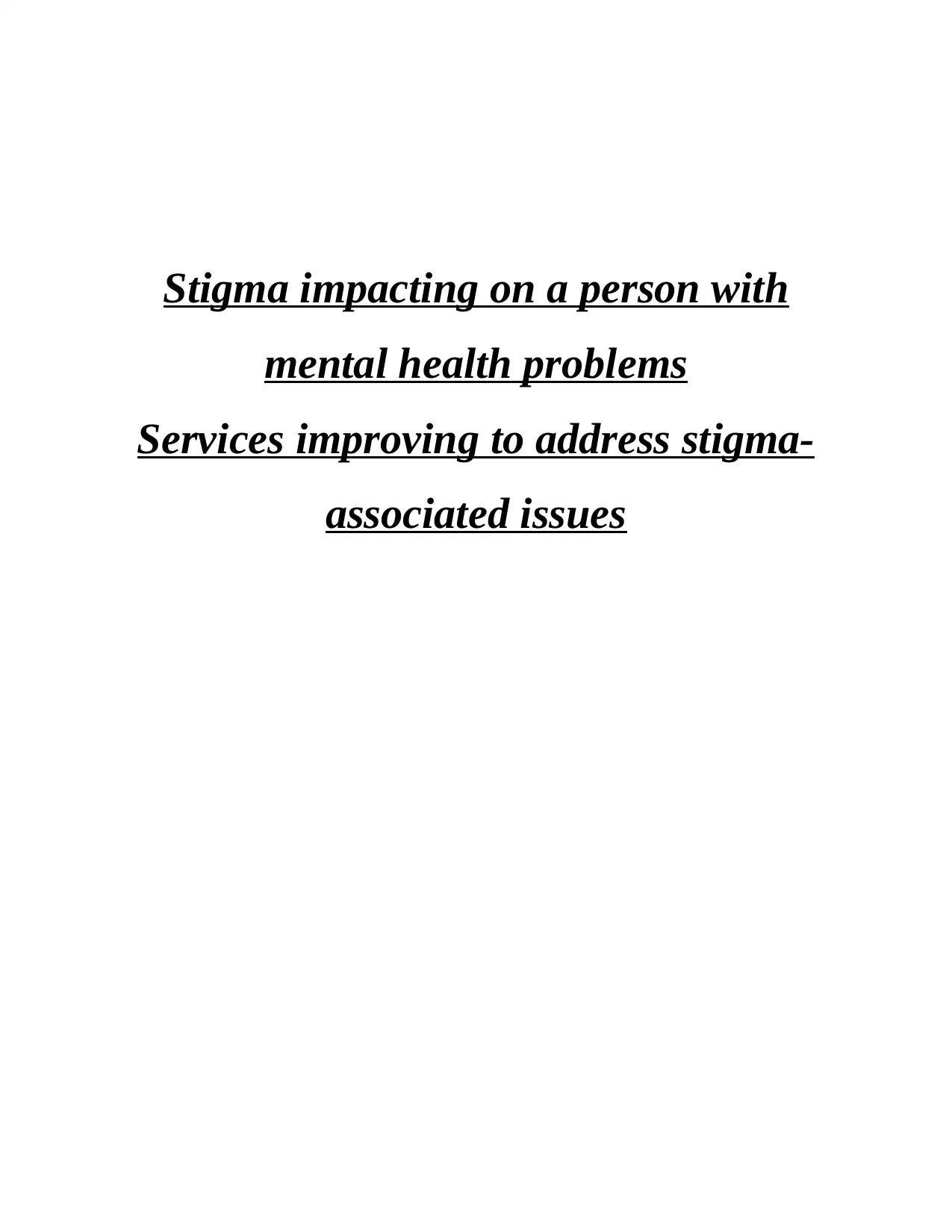
Stigma impacting on a person with
mental health problems
Services improving to address stigma-
associated issues
mental health problems
Services improving to address stigma-
associated issues
Paraphrase This Document
Need a fresh take? Get an instant paraphrase of this document with our AI Paraphraser
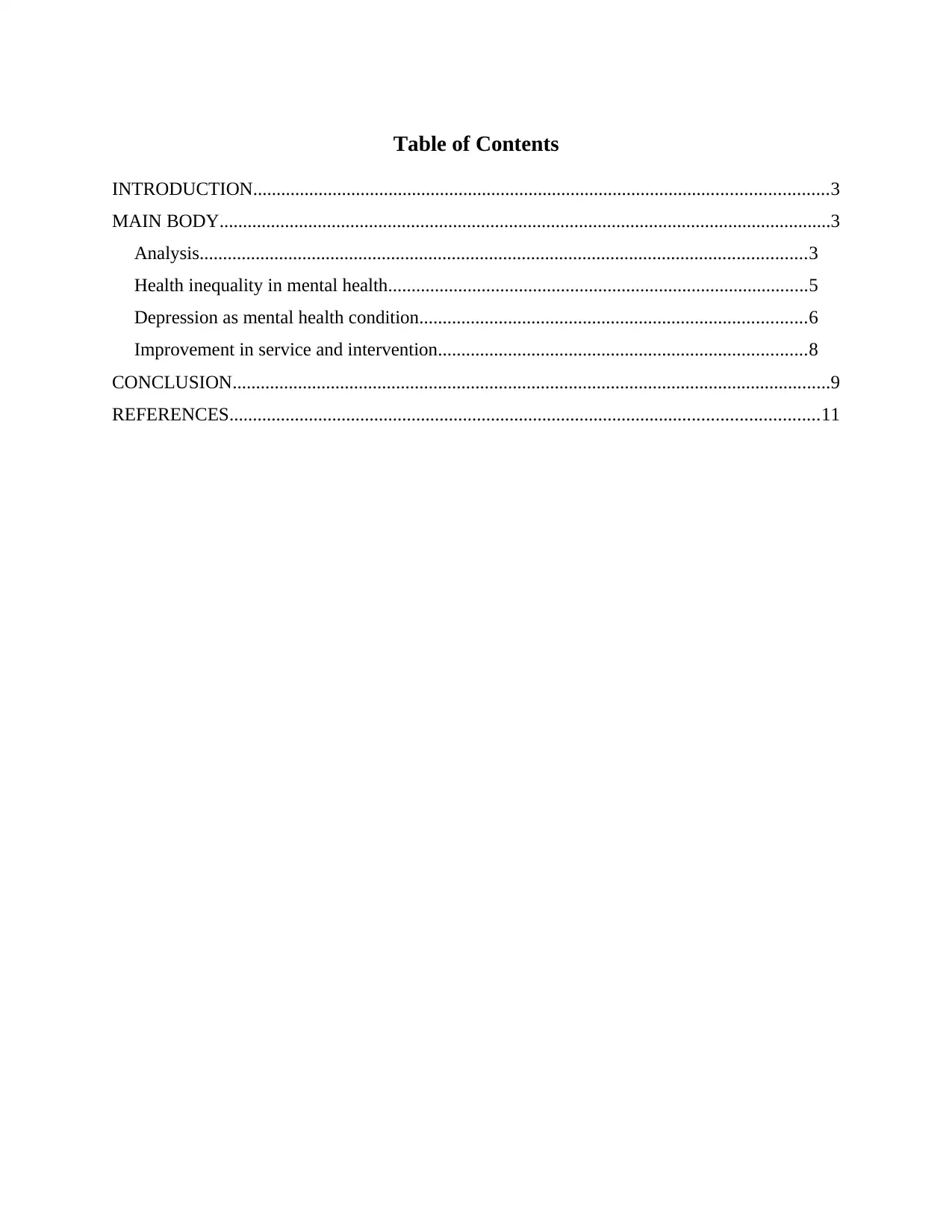
Table of Contents
INTRODUCTION...........................................................................................................................3
MAIN BODY...................................................................................................................................3
Analysis..................................................................................................................................3
Health inequality in mental health..........................................................................................5
Depression as mental health condition...................................................................................6
Improvement in service and intervention...............................................................................8
CONCLUSION................................................................................................................................9
REFERENCES..............................................................................................................................11
INTRODUCTION...........................................................................................................................3
MAIN BODY...................................................................................................................................3
Analysis..................................................................................................................................3
Health inequality in mental health..........................................................................................5
Depression as mental health condition...................................................................................6
Improvement in service and intervention...............................................................................8
CONCLUSION................................................................................................................................9
REFERENCES..............................................................................................................................11
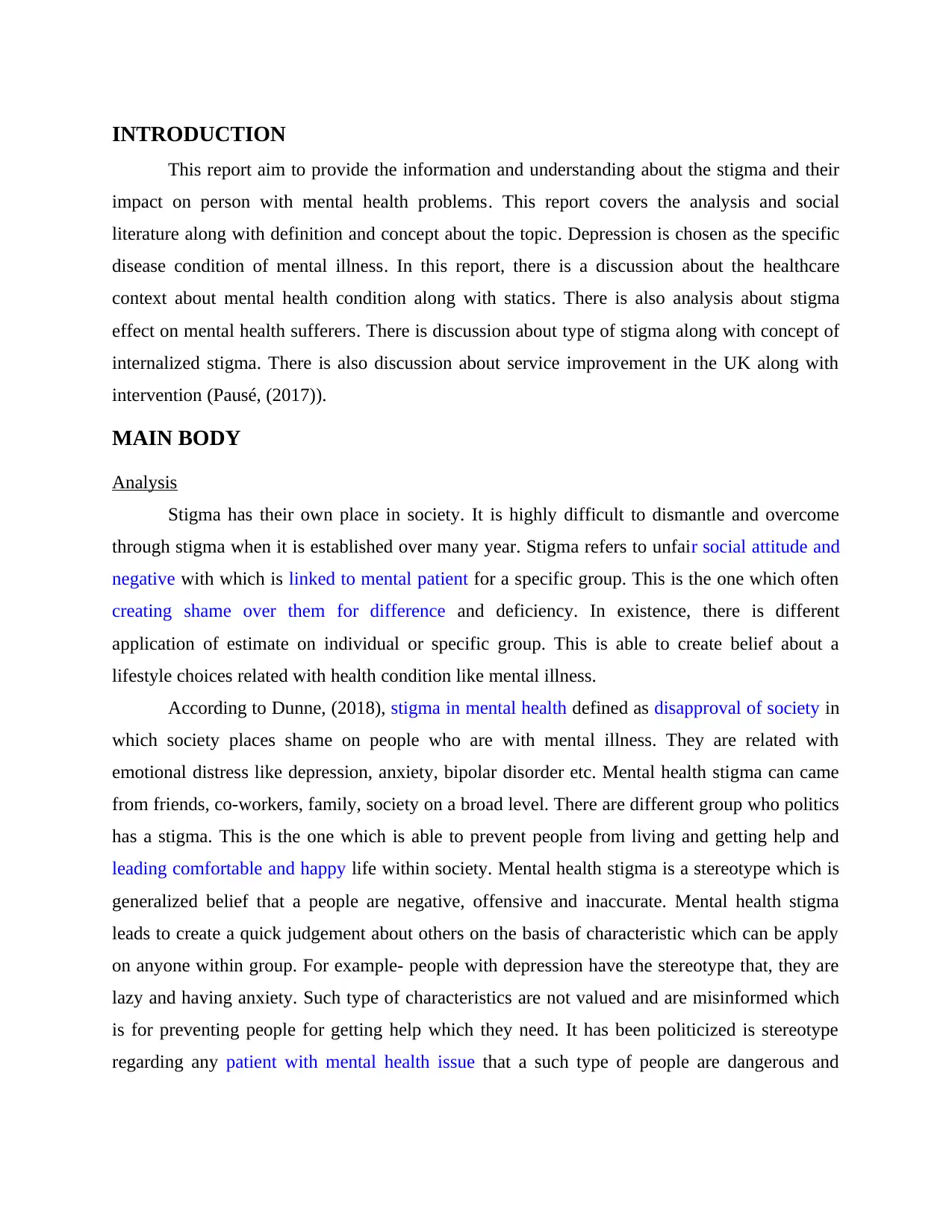
INTRODUCTION
This report aim to provide the information and understanding about the stigma and their
impact on person with mental health problems. This report covers the analysis and social
literature along with definition and concept about the topic. Depression is chosen as the specific
disease condition of mental illness. In this report, there is a discussion about the healthcare
context about mental health condition along with statics. There is also analysis about stigma
effect on mental health sufferers. There is discussion about type of stigma along with concept of
internalized stigma. There is also discussion about service improvement in the UK along with
intervention (Pausé, (2017)).
MAIN BODY
Analysis
Stigma has their own place in society. It is highly difficult to dismantle and overcome
through stigma when it is established over many year. Stigma refers to unfair social attitude and
negative with which is linked to mental patient for a specific group. This is the one which often
creating shame over them for difference and deficiency. In existence, there is different
application of estimate on individual or specific group. This is able to create belief about a
lifestyle choices related with health condition like mental illness.
According to Dunne, (2018), stigma in mental health defined as disapproval of society in
which society places shame on people who are with mental illness. They are related with
emotional distress like depression, anxiety, bipolar disorder etc. Mental health stigma can came
from friends, co-workers, family, society on a broad level. There are different group who politics
has a stigma. This is the one which is able to prevent people from living and getting help and
leading comfortable and happy life within society. Mental health stigma is a stereotype which is
generalized belief that a people are negative, offensive and inaccurate. Mental health stigma
leads to create a quick judgement about others on the basis of characteristic which can be apply
on anyone within group. For example- people with depression have the stereotype that, they are
lazy and having anxiety. Such type of characteristics are not valued and are misinformed which
is for preventing people for getting help which they need. It has been politicized is stereotype
regarding any patient with mental health issue that a such type of people are dangerous and
This report aim to provide the information and understanding about the stigma and their
impact on person with mental health problems. This report covers the analysis and social
literature along with definition and concept about the topic. Depression is chosen as the specific
disease condition of mental illness. In this report, there is a discussion about the healthcare
context about mental health condition along with statics. There is also analysis about stigma
effect on mental health sufferers. There is discussion about type of stigma along with concept of
internalized stigma. There is also discussion about service improvement in the UK along with
intervention (Pausé, (2017)).
MAIN BODY
Analysis
Stigma has their own place in society. It is highly difficult to dismantle and overcome
through stigma when it is established over many year. Stigma refers to unfair social attitude and
negative with which is linked to mental patient for a specific group. This is the one which often
creating shame over them for difference and deficiency. In existence, there is different
application of estimate on individual or specific group. This is able to create belief about a
lifestyle choices related with health condition like mental illness.
According to Dunne, (2018), stigma in mental health defined as disapproval of society in
which society places shame on people who are with mental illness. They are related with
emotional distress like depression, anxiety, bipolar disorder etc. Mental health stigma can came
from friends, co-workers, family, society on a broad level. There are different group who politics
has a stigma. This is the one which is able to prevent people from living and getting help and
leading comfortable and happy life within society. Mental health stigma is a stereotype which is
generalized belief that a people are negative, offensive and inaccurate. Mental health stigma
leads to create a quick judgement about others on the basis of characteristic which can be apply
on anyone within group. For example- people with depression have the stereotype that, they are
lazy and having anxiety. Such type of characteristics are not valued and are misinformed which
is for preventing people for getting help which they need. It has been politicized is stereotype
regarding any patient with mental health issue that a such type of people are dangerous and
⊘ This is a preview!⊘
Do you want full access?
Subscribe today to unlock all pages.

Trusted by 1+ million students worldwide
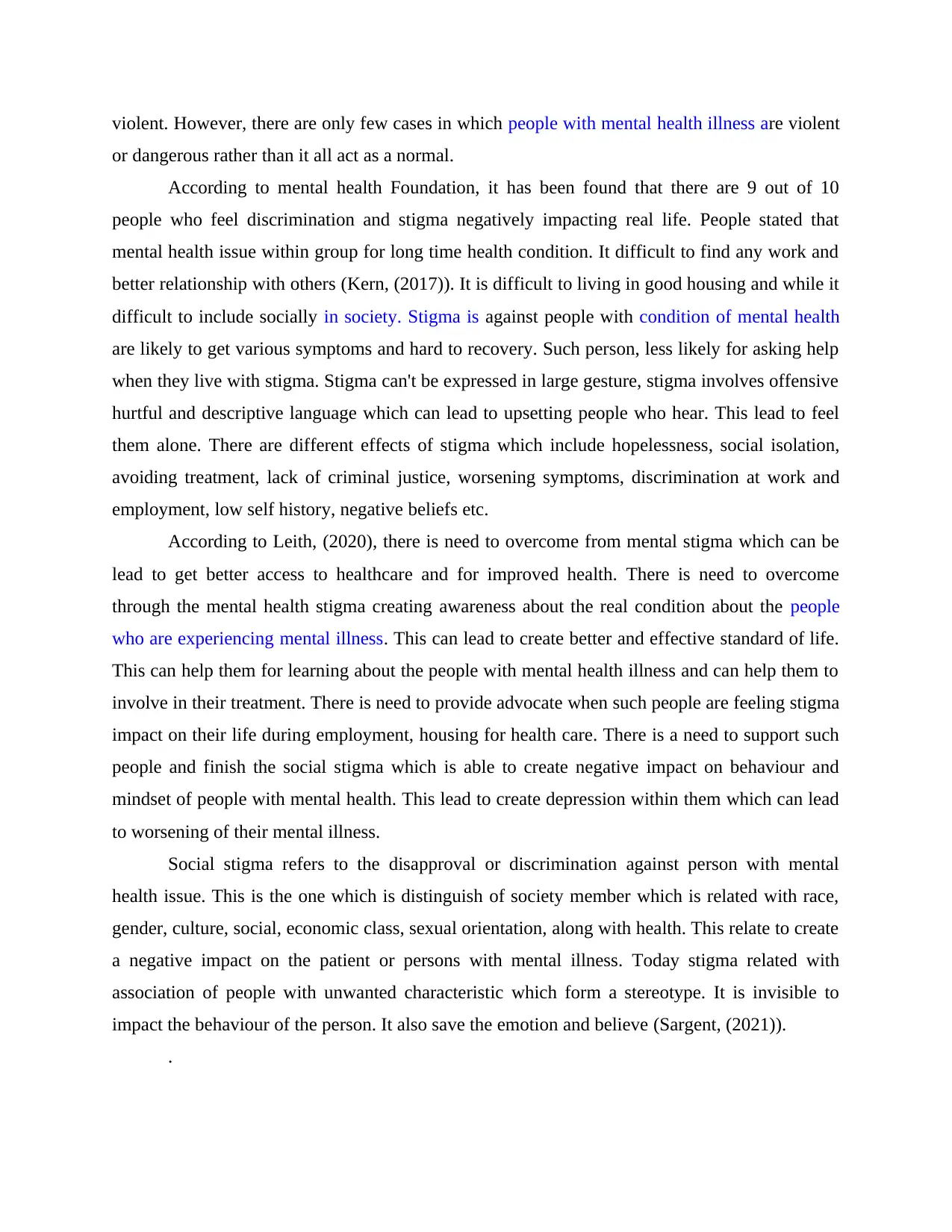
violent. However, there are only few cases in which people with mental health illness are violent
or dangerous rather than it all act as a normal.
According to mental health Foundation, it has been found that there are 9 out of 10
people who feel discrimination and stigma negatively impacting real life. People stated that
mental health issue within group for long time health condition. It difficult to find any work and
better relationship with others (Kern, (2017)). It is difficult to living in good housing and while it
difficult to include socially in society. Stigma is against people with condition of mental health
are likely to get various symptoms and hard to recovery. Such person, less likely for asking help
when they live with stigma. Stigma can't be expressed in large gesture, stigma involves offensive
hurtful and descriptive language which can lead to upsetting people who hear. This lead to feel
them alone. There are different effects of stigma which include hopelessness, social isolation,
avoiding treatment, lack of criminal justice, worsening symptoms, discrimination at work and
employment, low self history, negative beliefs etc.
According to Leith, (2020), there is need to overcome from mental stigma which can be
lead to get better access to healthcare and for improved health. There is need to overcome
through the mental health stigma creating awareness about the real condition about the people
who are experiencing mental illness. This can lead to create better and effective standard of life.
This can help them for learning about the people with mental health illness and can help them to
involve in their treatment. There is need to provide advocate when such people are feeling stigma
impact on their life during employment, housing for health care. There is a need to support such
people and finish the social stigma which is able to create negative impact on behaviour and
mindset of people with mental health. This lead to create depression within them which can lead
to worsening of their mental illness.
Social stigma refers to the disapproval or discrimination against person with mental
health issue. This is the one which is distinguish of society member which is related with race,
gender, culture, social, economic class, sexual orientation, along with health. This relate to create
a negative impact on the patient or persons with mental illness. Today stigma related with
association of people with unwanted characteristic which form a stereotype. It is invisible to
impact the behaviour of the person. It also save the emotion and believe (Sargent, (2021)).
.
or dangerous rather than it all act as a normal.
According to mental health Foundation, it has been found that there are 9 out of 10
people who feel discrimination and stigma negatively impacting real life. People stated that
mental health issue within group for long time health condition. It difficult to find any work and
better relationship with others (Kern, (2017)). It is difficult to living in good housing and while it
difficult to include socially in society. Stigma is against people with condition of mental health
are likely to get various symptoms and hard to recovery. Such person, less likely for asking help
when they live with stigma. Stigma can't be expressed in large gesture, stigma involves offensive
hurtful and descriptive language which can lead to upsetting people who hear. This lead to feel
them alone. There are different effects of stigma which include hopelessness, social isolation,
avoiding treatment, lack of criminal justice, worsening symptoms, discrimination at work and
employment, low self history, negative beliefs etc.
According to Leith, (2020), there is need to overcome from mental stigma which can be
lead to get better access to healthcare and for improved health. There is need to overcome
through the mental health stigma creating awareness about the real condition about the people
who are experiencing mental illness. This can lead to create better and effective standard of life.
This can help them for learning about the people with mental health illness and can help them to
involve in their treatment. There is need to provide advocate when such people are feeling stigma
impact on their life during employment, housing for health care. There is a need to support such
people and finish the social stigma which is able to create negative impact on behaviour and
mindset of people with mental health. This lead to create depression within them which can lead
to worsening of their mental illness.
Social stigma refers to the disapproval or discrimination against person with mental
health issue. This is the one which is distinguish of society member which is related with race,
gender, culture, social, economic class, sexual orientation, along with health. This relate to create
a negative impact on the patient or persons with mental illness. Today stigma related with
association of people with unwanted characteristic which form a stereotype. It is invisible to
impact the behaviour of the person. It also save the emotion and believe (Sargent, (2021)).
.
Paraphrase This Document
Need a fresh take? Get an instant paraphrase of this document with our AI Paraphraser
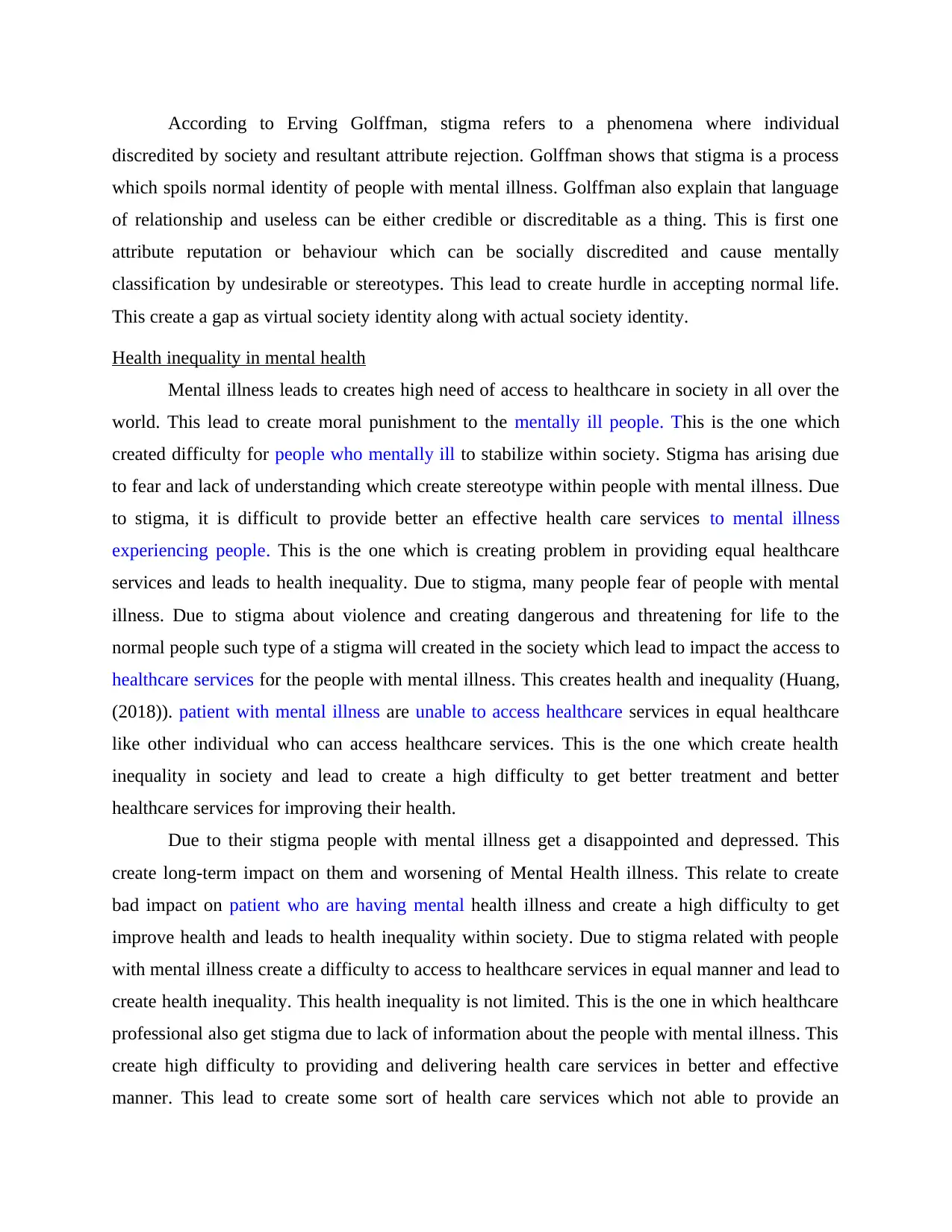
According to Erving Golffman, stigma refers to a phenomena where individual
discredited by society and resultant attribute rejection. Golffman shows that stigma is a process
which spoils normal identity of people with mental illness. Golffman also explain that language
of relationship and useless can be either credible or discreditable as a thing. This is first one
attribute reputation or behaviour which can be socially discredited and cause mentally
classification by undesirable or stereotypes. This lead to create hurdle in accepting normal life.
This create a gap as virtual society identity along with actual society identity.
Health inequality in mental health
Mental illness leads to creates high need of access to healthcare in society in all over the
world. This lead to create moral punishment to the mentally ill people. This is the one which
created difficulty for people who mentally ill to stabilize within society. Stigma has arising due
to fear and lack of understanding which create stereotype within people with mental illness. Due
to stigma, it is difficult to provide better an effective health care services to mental illness
experiencing people. This is the one which is creating problem in providing equal healthcare
services and leads to health inequality. Due to stigma, many people fear of people with mental
illness. Due to stigma about violence and creating dangerous and threatening for life to the
normal people such type of a stigma will created in the society which lead to impact the access to
healthcare services for the people with mental illness. This creates health and inequality (Huang,
(2018)). patient with mental illness are unable to access healthcare services in equal healthcare
like other individual who can access healthcare services. This is the one which create health
inequality in society and lead to create a high difficulty to get better treatment and better
healthcare services for improving their health.
Due to their stigma people with mental illness get a disappointed and depressed. This
create long-term impact on them and worsening of Mental Health illness. This relate to create
bad impact on patient who are having mental health illness and create a high difficulty to get
improve health and leads to health inequality within society. Due to stigma related with people
with mental illness create a difficulty to access to healthcare services in equal manner and lead to
create health inequality. This health inequality is not limited. This is the one in which healthcare
professional also get stigma due to lack of information about the people with mental illness. This
create high difficulty to providing and delivering health care services in better and effective
manner. This lead to create some sort of health care services which not able to provide an
discredited by society and resultant attribute rejection. Golffman shows that stigma is a process
which spoils normal identity of people with mental illness. Golffman also explain that language
of relationship and useless can be either credible or discreditable as a thing. This is first one
attribute reputation or behaviour which can be socially discredited and cause mentally
classification by undesirable or stereotypes. This lead to create hurdle in accepting normal life.
This create a gap as virtual society identity along with actual society identity.
Health inequality in mental health
Mental illness leads to creates high need of access to healthcare in society in all over the
world. This lead to create moral punishment to the mentally ill people. This is the one which
created difficulty for people who mentally ill to stabilize within society. Stigma has arising due
to fear and lack of understanding which create stereotype within people with mental illness. Due
to stigma, it is difficult to provide better an effective health care services to mental illness
experiencing people. This is the one which is creating problem in providing equal healthcare
services and leads to health inequality. Due to stigma, many people fear of people with mental
illness. Due to stigma about violence and creating dangerous and threatening for life to the
normal people such type of a stigma will created in the society which lead to impact the access to
healthcare services for the people with mental illness. This creates health and inequality (Huang,
(2018)). patient with mental illness are unable to access healthcare services in equal healthcare
like other individual who can access healthcare services. This is the one which create health
inequality in society and lead to create a high difficulty to get better treatment and better
healthcare services for improving their health.
Due to their stigma people with mental illness get a disappointed and depressed. This
create long-term impact on them and worsening of Mental Health illness. This relate to create
bad impact on patient who are having mental health illness and create a high difficulty to get
improve health and leads to health inequality within society. Due to stigma related with people
with mental illness create a difficulty to access to healthcare services in equal manner and lead to
create health inequality. This health inequality is not limited. This is the one in which healthcare
professional also get stigma due to lack of information about the people with mental illness. This
create high difficulty to providing and delivering health care services in better and effective
manner. This lead to create some sort of health care services which not able to provide an
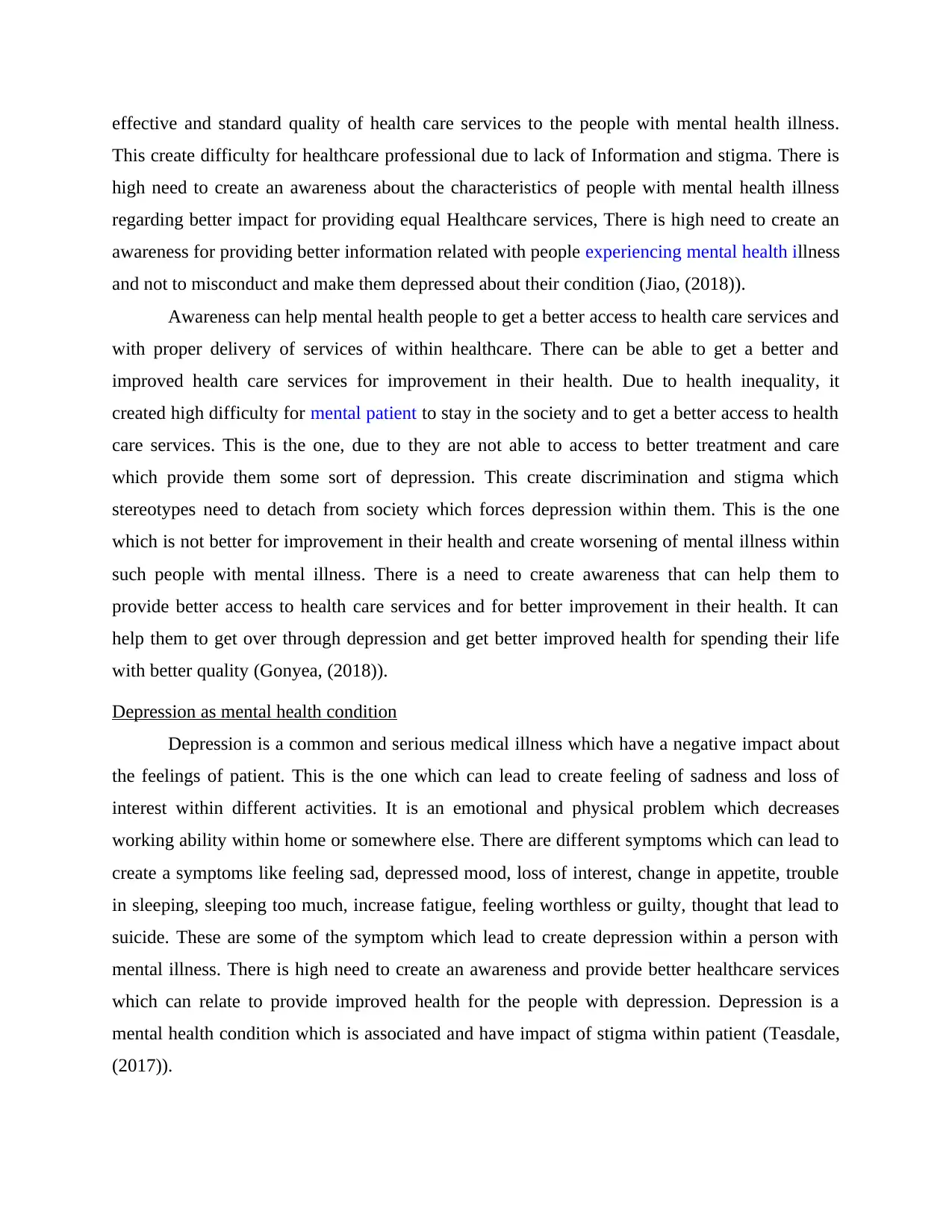
effective and standard quality of health care services to the people with mental health illness.
This create difficulty for healthcare professional due to lack of Information and stigma. There is
high need to create an awareness about the characteristics of people with mental health illness
regarding better impact for providing equal Healthcare services, There is high need to create an
awareness for providing better information related with people experiencing mental health illness
and not to misconduct and make them depressed about their condition (Jiao, (2018)).
Awareness can help mental health people to get a better access to health care services and
with proper delivery of services of within healthcare. There can be able to get a better and
improved health care services for improvement in their health. Due to health inequality, it
created high difficulty for mental patient to stay in the society and to get a better access to health
care services. This is the one, due to they are not able to access to better treatment and care
which provide them some sort of depression. This create discrimination and stigma which
stereotypes need to detach from society which forces depression within them. This is the one
which is not better for improvement in their health and create worsening of mental illness within
such people with mental illness. There is a need to create awareness that can help them to
provide better access to health care services and for better improvement in their health. It can
help them to get over through depression and get better improved health for spending their life
with better quality (Gonyea, (2018)).
Depression as mental health condition
Depression is a common and serious medical illness which have a negative impact about
the feelings of patient. This is the one which can lead to create feeling of sadness and loss of
interest within different activities. It is an emotional and physical problem which decreases
working ability within home or somewhere else. There are different symptoms which can lead to
create a symptoms like feeling sad, depressed mood, loss of interest, change in appetite, trouble
in sleeping, sleeping too much, increase fatigue, feeling worthless or guilty, thought that lead to
suicide. These are some of the symptom which lead to create depression within a person with
mental illness. There is high need to create an awareness and provide better healthcare services
which can relate to provide improved health for the people with depression. Depression is a
mental health condition which is associated and have impact of stigma within patient (Teasdale,
(2017)).
This create difficulty for healthcare professional due to lack of Information and stigma. There is
high need to create an awareness about the characteristics of people with mental health illness
regarding better impact for providing equal Healthcare services, There is high need to create an
awareness for providing better information related with people experiencing mental health illness
and not to misconduct and make them depressed about their condition (Jiao, (2018)).
Awareness can help mental health people to get a better access to health care services and
with proper delivery of services of within healthcare. There can be able to get a better and
improved health care services for improvement in their health. Due to health inequality, it
created high difficulty for mental patient to stay in the society and to get a better access to health
care services. This is the one, due to they are not able to access to better treatment and care
which provide them some sort of depression. This create discrimination and stigma which
stereotypes need to detach from society which forces depression within them. This is the one
which is not better for improvement in their health and create worsening of mental illness within
such people with mental illness. There is a need to create awareness that can help them to
provide better access to health care services and for better improvement in their health. It can
help them to get over through depression and get better improved health for spending their life
with better quality (Gonyea, (2018)).
Depression as mental health condition
Depression is a common and serious medical illness which have a negative impact about
the feelings of patient. This is the one which can lead to create feeling of sadness and loss of
interest within different activities. It is an emotional and physical problem which decreases
working ability within home or somewhere else. There are different symptoms which can lead to
create a symptoms like feeling sad, depressed mood, loss of interest, change in appetite, trouble
in sleeping, sleeping too much, increase fatigue, feeling worthless or guilty, thought that lead to
suicide. These are some of the symptom which lead to create depression within a person with
mental illness. There is high need to create an awareness and provide better healthcare services
which can relate to provide improved health for the people with depression. Depression is a
mental health condition which is associated and have impact of stigma within patient (Teasdale,
(2017)).
⊘ This is a preview!⊘
Do you want full access?
Subscribe today to unlock all pages.

Trusted by 1+ million students worldwide
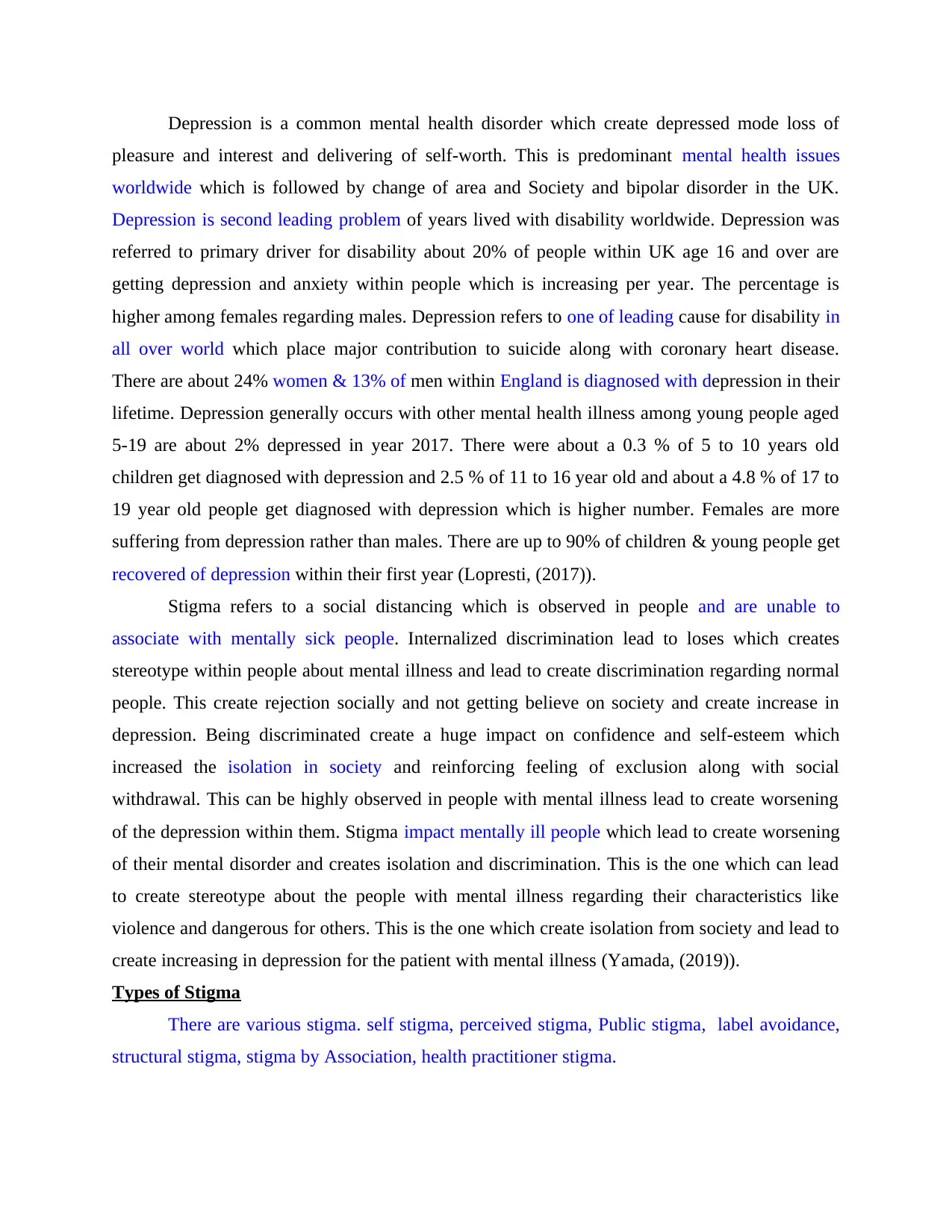
Depression is a common mental health disorder which create depressed mode loss of
pleasure and interest and delivering of self-worth. This is predominant mental health issues
worldwide which is followed by change of area and Society and bipolar disorder in the UK.
Depression is second leading problem of years lived with disability worldwide. Depression was
referred to primary driver for disability about 20% of people within UK age 16 and over are
getting depression and anxiety within people which is increasing per year. The percentage is
higher among females regarding males. Depression refers to one of leading cause for disability in
all over world which place major contribution to suicide along with coronary heart disease.
There are about 24% women & 13% of men within England is diagnosed with depression in their
lifetime. Depression generally occurs with other mental health illness among young people aged
5-19 are about 2% depressed in year 2017. There were about a 0.3 % of 5 to 10 years old
children get diagnosed with depression and 2.5 % of 11 to 16 year old and about a 4.8 % of 17 to
19 year old people get diagnosed with depression which is higher number. Females are more
suffering from depression rather than males. There are up to 90% of children & young people get
recovered of depression within their first year (Lopresti, (2017)).
Stigma refers to a social distancing which is observed in people and are unable to
associate with mentally sick people. Internalized discrimination lead to loses which creates
stereotype within people about mental illness and lead to create discrimination regarding normal
people. This create rejection socially and not getting believe on society and create increase in
depression. Being discriminated create a huge impact on confidence and self-esteem which
increased the isolation in society and reinforcing feeling of exclusion along with social
withdrawal. This can be highly observed in people with mental illness lead to create worsening
of the depression within them. Stigma impact mentally ill people which lead to create worsening
of their mental disorder and creates isolation and discrimination. This is the one which can lead
to create stereotype about the people with mental illness regarding their characteristics like
violence and dangerous for others. This is the one which create isolation from society and lead to
create increasing in depression for the patient with mental illness (Yamada, (2019)).
Types of Stigma
There are various stigma. self stigma, perceived stigma, Public stigma, label avoidance,
structural stigma, stigma by Association, health practitioner stigma.
pleasure and interest and delivering of self-worth. This is predominant mental health issues
worldwide which is followed by change of area and Society and bipolar disorder in the UK.
Depression is second leading problem of years lived with disability worldwide. Depression was
referred to primary driver for disability about 20% of people within UK age 16 and over are
getting depression and anxiety within people which is increasing per year. The percentage is
higher among females regarding males. Depression refers to one of leading cause for disability in
all over world which place major contribution to suicide along with coronary heart disease.
There are about 24% women & 13% of men within England is diagnosed with depression in their
lifetime. Depression generally occurs with other mental health illness among young people aged
5-19 are about 2% depressed in year 2017. There were about a 0.3 % of 5 to 10 years old
children get diagnosed with depression and 2.5 % of 11 to 16 year old and about a 4.8 % of 17 to
19 year old people get diagnosed with depression which is higher number. Females are more
suffering from depression rather than males. There are up to 90% of children & young people get
recovered of depression within their first year (Lopresti, (2017)).
Stigma refers to a social distancing which is observed in people and are unable to
associate with mentally sick people. Internalized discrimination lead to loses which creates
stereotype within people about mental illness and lead to create discrimination regarding normal
people. This create rejection socially and not getting believe on society and create increase in
depression. Being discriminated create a huge impact on confidence and self-esteem which
increased the isolation in society and reinforcing feeling of exclusion along with social
withdrawal. This can be highly observed in people with mental illness lead to create worsening
of the depression within them. Stigma impact mentally ill people which lead to create worsening
of their mental disorder and creates isolation and discrimination. This is the one which can lead
to create stereotype about the people with mental illness regarding their characteristics like
violence and dangerous for others. This is the one which create isolation from society and lead to
create increasing in depression for the patient with mental illness (Yamada, (2019)).
Types of Stigma
There are various stigma. self stigma, perceived stigma, Public stigma, label avoidance,
structural stigma, stigma by Association, health practitioner stigma.
Paraphrase This Document
Need a fresh take? Get an instant paraphrase of this document with our AI Paraphraser
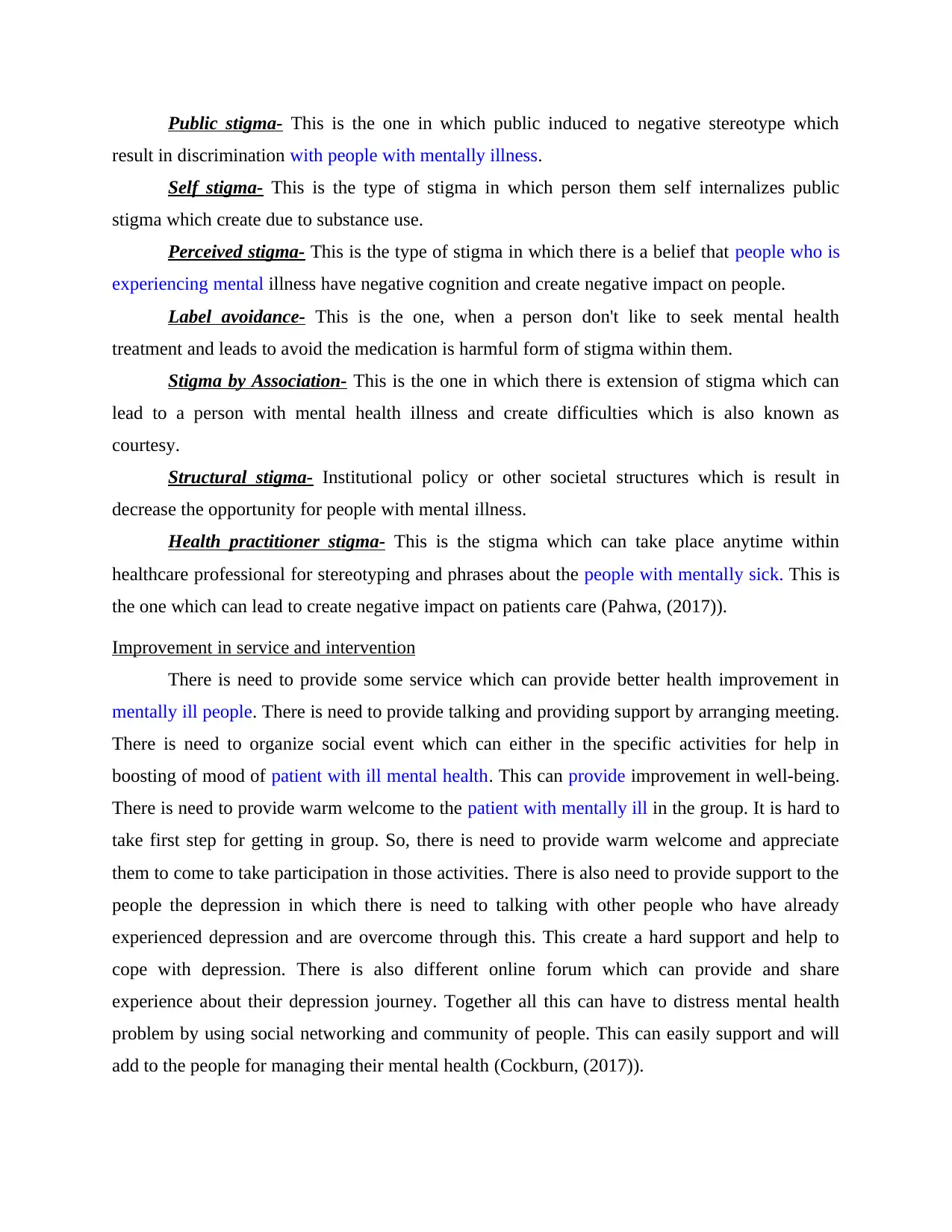
Public stigma- This is the one in which public induced to negative stereotype which
result in discrimination with people with mentally illness.
Self stigma- This is the type of stigma in which person them self internalizes public
stigma which create due to substance use.
Perceived stigma- This is the type of stigma in which there is a belief that people who is
experiencing mental illness have negative cognition and create negative impact on people.
Label avoidance- This is the one, when a person don't like to seek mental health
treatment and leads to avoid the medication is harmful form of stigma within them.
Stigma by Association- This is the one in which there is extension of stigma which can
lead to a person with mental health illness and create difficulties which is also known as
courtesy.
Structural stigma- Institutional policy or other societal structures which is result in
decrease the opportunity for people with mental illness.
Health practitioner stigma- This is the stigma which can take place anytime within
healthcare professional for stereotyping and phrases about the people with mentally sick. This is
the one which can lead to create negative impact on patients care (Pahwa, (2017)).
Improvement in service and intervention
There is need to provide some service which can provide better health improvement in
mentally ill people. There is need to provide talking and providing support by arranging meeting.
There is need to organize social event which can either in the specific activities for help in
boosting of mood of patient with ill mental health. This can provide improvement in well-being.
There is need to provide warm welcome to the patient with mentally ill in the group. It is hard to
take first step for getting in group. So, there is need to provide warm welcome and appreciate
them to come to take participation in those activities. There is also need to provide support to the
people the depression in which there is need to talking with other people who have already
experienced depression and are overcome through this. This create a hard support and help to
cope with depression. There is also different online forum which can provide and share
experience about their depression journey. Together all this can have to distress mental health
problem by using social networking and community of people. This can easily support and will
add to the people for managing their mental health (Cockburn, (2017)).
result in discrimination with people with mentally illness.
Self stigma- This is the type of stigma in which person them self internalizes public
stigma which create due to substance use.
Perceived stigma- This is the type of stigma in which there is a belief that people who is
experiencing mental illness have negative cognition and create negative impact on people.
Label avoidance- This is the one, when a person don't like to seek mental health
treatment and leads to avoid the medication is harmful form of stigma within them.
Stigma by Association- This is the one in which there is extension of stigma which can
lead to a person with mental health illness and create difficulties which is also known as
courtesy.
Structural stigma- Institutional policy or other societal structures which is result in
decrease the opportunity for people with mental illness.
Health practitioner stigma- This is the stigma which can take place anytime within
healthcare professional for stereotyping and phrases about the people with mentally sick. This is
the one which can lead to create negative impact on patients care (Pahwa, (2017)).
Improvement in service and intervention
There is need to provide some service which can provide better health improvement in
mentally ill people. There is need to provide talking and providing support by arranging meeting.
There is need to organize social event which can either in the specific activities for help in
boosting of mood of patient with ill mental health. This can provide improvement in well-being.
There is need to provide warm welcome to the patient with mentally ill in the group. It is hard to
take first step for getting in group. So, there is need to provide warm welcome and appreciate
them to come to take participation in those activities. There is also need to provide support to the
people the depression in which there is need to talking with other people who have already
experienced depression and are overcome through this. This create a hard support and help to
cope with depression. There is also different online forum which can provide and share
experience about their depression journey. Together all this can have to distress mental health
problem by using social networking and community of people. This can easily support and will
add to the people for managing their mental health (Cockburn, (2017)).
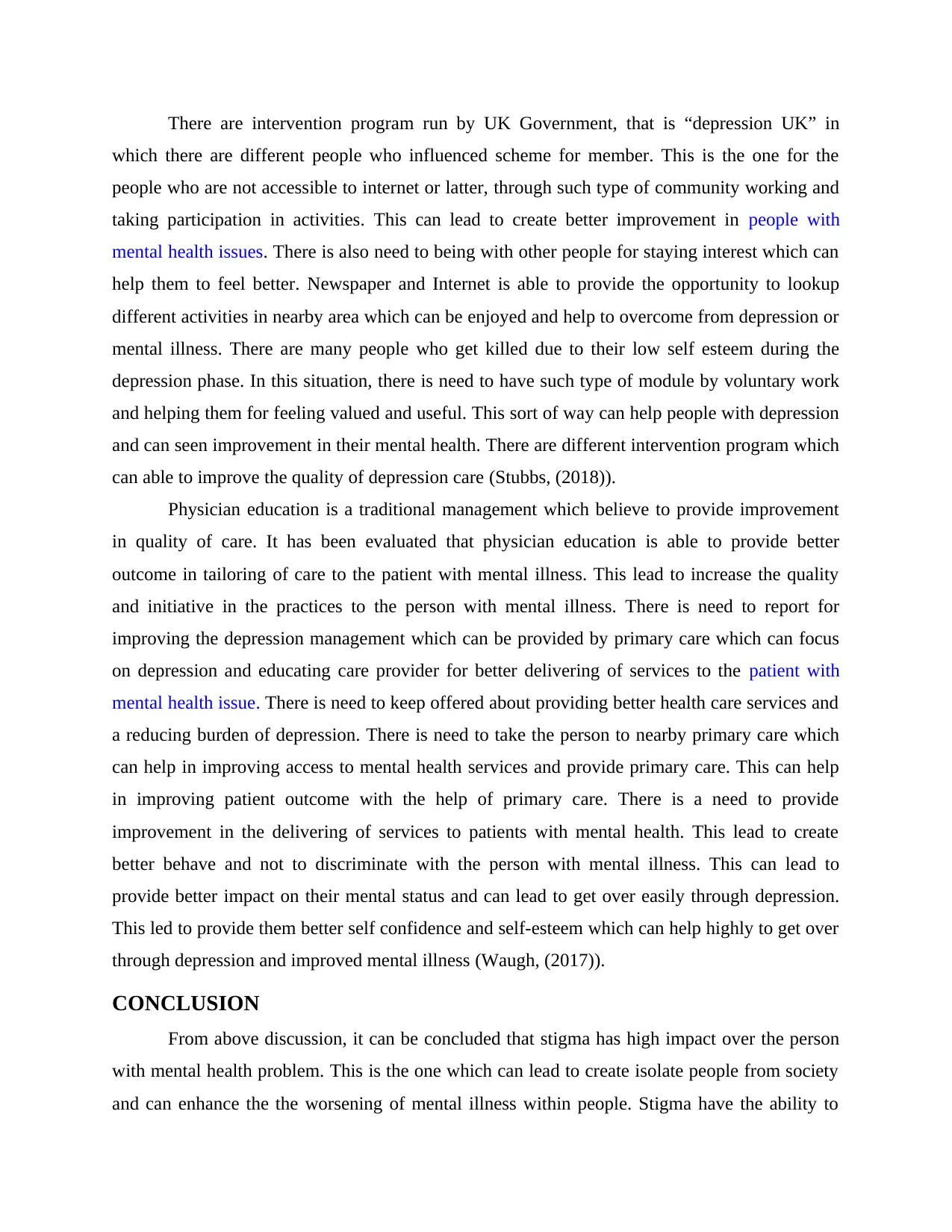
There are intervention program run by UK Government, that is “depression UK” in
which there are different people who influenced scheme for member. This is the one for the
people who are not accessible to internet or latter, through such type of community working and
taking participation in activities. This can lead to create better improvement in people with
mental health issues. There is also need to being with other people for staying interest which can
help them to feel better. Newspaper and Internet is able to provide the opportunity to lookup
different activities in nearby area which can be enjoyed and help to overcome from depression or
mental illness. There are many people who get killed due to their low self esteem during the
depression phase. In this situation, there is need to have such type of module by voluntary work
and helping them for feeling valued and useful. This sort of way can help people with depression
and can seen improvement in their mental health. There are different intervention program which
can able to improve the quality of depression care (Stubbs, (2018)).
Physician education is a traditional management which believe to provide improvement
in quality of care. It has been evaluated that physician education is able to provide better
outcome in tailoring of care to the patient with mental illness. This lead to increase the quality
and initiative in the practices to the person with mental illness. There is need to report for
improving the depression management which can be provided by primary care which can focus
on depression and educating care provider for better delivering of services to the patient with
mental health issue. There is need to keep offered about providing better health care services and
a reducing burden of depression. There is need to take the person to nearby primary care which
can help in improving access to mental health services and provide primary care. This can help
in improving patient outcome with the help of primary care. There is a need to provide
improvement in the delivering of services to patients with mental health. This lead to create
better behave and not to discriminate with the person with mental illness. This can lead to
provide better impact on their mental status and can lead to get over easily through depression.
This led to provide them better self confidence and self-esteem which can help highly to get over
through depression and improved mental illness (Waugh, (2017)).
CONCLUSION
From above discussion, it can be concluded that stigma has high impact over the person
with mental health problem. This is the one which can lead to create isolate people from society
and can enhance the the worsening of mental illness within people. Stigma have the ability to
which there are different people who influenced scheme for member. This is the one for the
people who are not accessible to internet or latter, through such type of community working and
taking participation in activities. This can lead to create better improvement in people with
mental health issues. There is also need to being with other people for staying interest which can
help them to feel better. Newspaper and Internet is able to provide the opportunity to lookup
different activities in nearby area which can be enjoyed and help to overcome from depression or
mental illness. There are many people who get killed due to their low self esteem during the
depression phase. In this situation, there is need to have such type of module by voluntary work
and helping them for feeling valued and useful. This sort of way can help people with depression
and can seen improvement in their mental health. There are different intervention program which
can able to improve the quality of depression care (Stubbs, (2018)).
Physician education is a traditional management which believe to provide improvement
in quality of care. It has been evaluated that physician education is able to provide better
outcome in tailoring of care to the patient with mental illness. This lead to increase the quality
and initiative in the practices to the person with mental illness. There is need to report for
improving the depression management which can be provided by primary care which can focus
on depression and educating care provider for better delivering of services to the patient with
mental health issue. There is need to keep offered about providing better health care services and
a reducing burden of depression. There is need to take the person to nearby primary care which
can help in improving access to mental health services and provide primary care. This can help
in improving patient outcome with the help of primary care. There is a need to provide
improvement in the delivering of services to patients with mental health. This lead to create
better behave and not to discriminate with the person with mental illness. This can lead to
provide better impact on their mental status and can lead to get over easily through depression.
This led to provide them better self confidence and self-esteem which can help highly to get over
through depression and improved mental illness (Waugh, (2017)).
CONCLUSION
From above discussion, it can be concluded that stigma has high impact over the person
with mental health problem. This is the one which can lead to create isolate people from society
and can enhance the the worsening of mental illness within people. Stigma have the ability to
⊘ This is a preview!⊘
Do you want full access?
Subscribe today to unlock all pages.

Trusted by 1+ million students worldwide
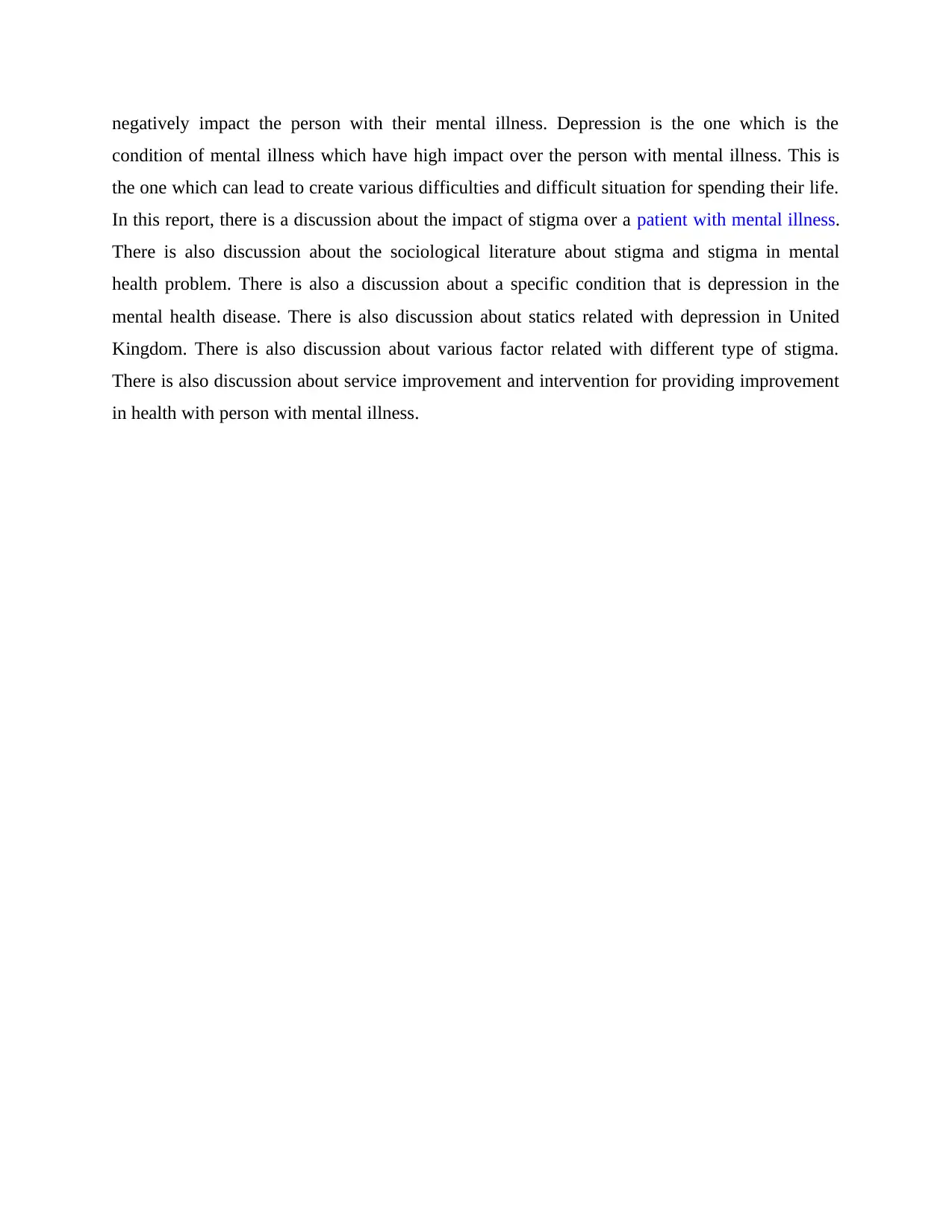
negatively impact the person with their mental illness. Depression is the one which is the
condition of mental illness which have high impact over the person with mental illness. This is
the one which can lead to create various difficulties and difficult situation for spending their life.
In this report, there is a discussion about the impact of stigma over a patient with mental illness.
There is also discussion about the sociological literature about stigma and stigma in mental
health problem. There is also a discussion about a specific condition that is depression in the
mental health disease. There is also discussion about statics related with depression in United
Kingdom. There is also discussion about various factor related with different type of stigma.
There is also discussion about service improvement and intervention for providing improvement
in health with person with mental illness.
condition of mental illness which have high impact over the person with mental illness. This is
the one which can lead to create various difficulties and difficult situation for spending their life.
In this report, there is a discussion about the impact of stigma over a patient with mental illness.
There is also discussion about the sociological literature about stigma and stigma in mental
health problem. There is also a discussion about a specific condition that is depression in the
mental health disease. There is also discussion about statics related with depression in United
Kingdom. There is also discussion about various factor related with different type of stigma.
There is also discussion about service improvement and intervention for providing improvement
in health with person with mental illness.
Paraphrase This Document
Need a fresh take? Get an instant paraphrase of this document with our AI Paraphraser
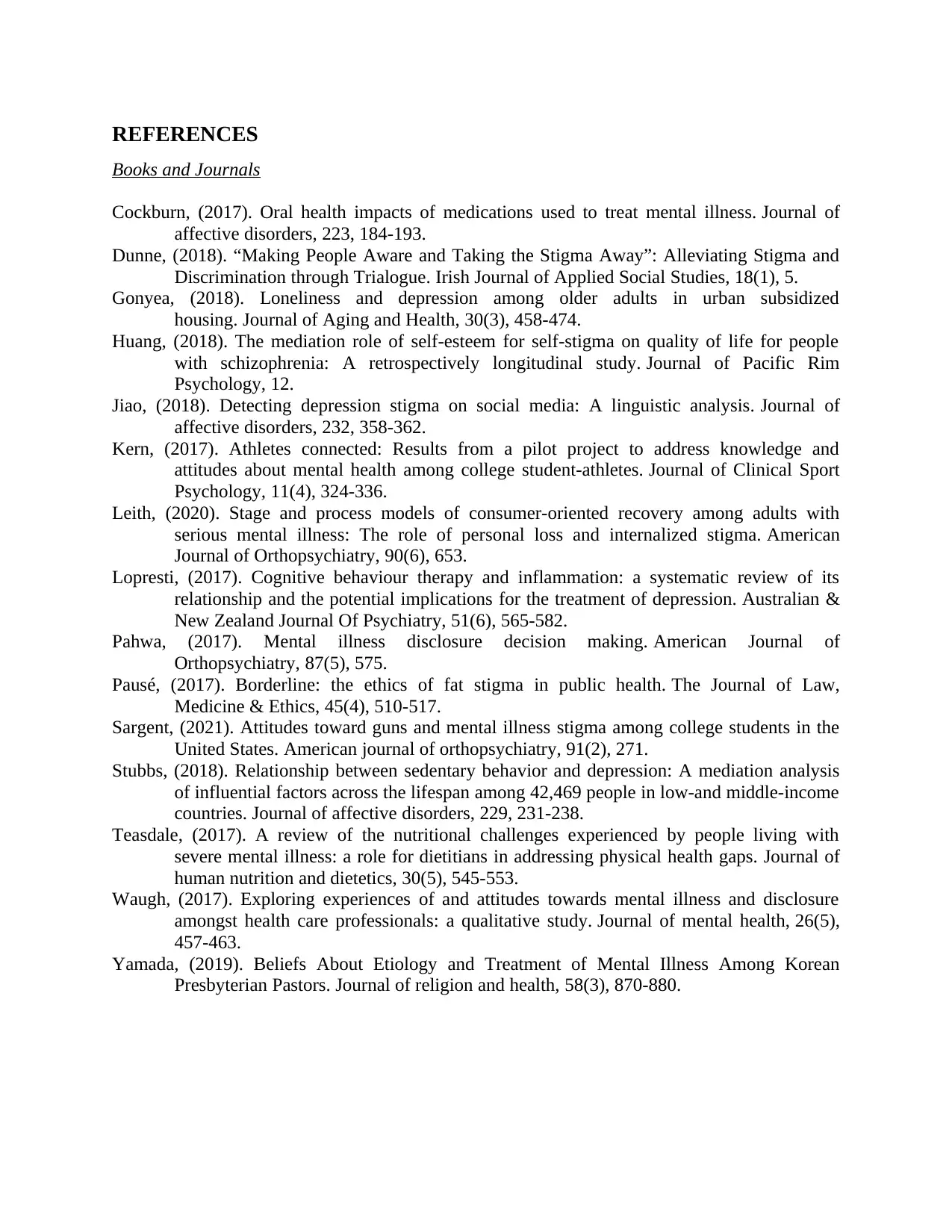
REFERENCES
Books and Journals
Cockburn, (2017). Oral health impacts of medications used to treat mental illness. Journal of
affective disorders, 223, 184-193.
Dunne, (2018). “Making People Aware and Taking the Stigma Away”: Alleviating Stigma and
Discrimination through Trialogue. Irish Journal of Applied Social Studies, 18(1), 5.
Gonyea, (2018). Loneliness and depression among older adults in urban subsidized
housing. Journal of Aging and Health, 30(3), 458-474.
Huang, (2018). The mediation role of self-esteem for self-stigma on quality of life for people
with schizophrenia: A retrospectively longitudinal study. Journal of Pacific Rim
Psychology, 12.
Jiao, (2018). Detecting depression stigma on social media: A linguistic analysis. Journal of
affective disorders, 232, 358-362.
Kern, (2017). Athletes connected: Results from a pilot project to address knowledge and
attitudes about mental health among college student-athletes. Journal of Clinical Sport
Psychology, 11(4), 324-336.
Leith, (2020). Stage and process models of consumer-oriented recovery among adults with
serious mental illness: The role of personal loss and internalized stigma. American
Journal of Orthopsychiatry, 90(6), 653.
Lopresti, (2017). Cognitive behaviour therapy and inflammation: a systematic review of its
relationship and the potential implications for the treatment of depression. Australian &
New Zealand Journal Of Psychiatry, 51(6), 565-582.
Pahwa, (2017). Mental illness disclosure decision making. American Journal of
Orthopsychiatry, 87(5), 575.
Pausé, (2017). Borderline: the ethics of fat stigma in public health. The Journal of Law,
Medicine & Ethics, 45(4), 510-517.
Sargent, (2021). Attitudes toward guns and mental illness stigma among college students in the
United States. American journal of orthopsychiatry, 91(2), 271.
Stubbs, (2018). Relationship between sedentary behavior and depression: A mediation analysis
of influential factors across the lifespan among 42,469 people in low-and middle-income
countries. Journal of affective disorders, 229, 231-238.
Teasdale, (2017). A review of the nutritional challenges experienced by people living with
severe mental illness: a role for dietitians in addressing physical health gaps. Journal of
human nutrition and dietetics, 30(5), 545-553.
Waugh, (2017). Exploring experiences of and attitudes towards mental illness and disclosure
amongst health care professionals: a qualitative study. Journal of mental health, 26(5),
457-463.
Yamada, (2019). Beliefs About Etiology and Treatment of Mental Illness Among Korean
Presbyterian Pastors. Journal of religion and health, 58(3), 870-880.
Books and Journals
Cockburn, (2017). Oral health impacts of medications used to treat mental illness. Journal of
affective disorders, 223, 184-193.
Dunne, (2018). “Making People Aware and Taking the Stigma Away”: Alleviating Stigma and
Discrimination through Trialogue. Irish Journal of Applied Social Studies, 18(1), 5.
Gonyea, (2018). Loneliness and depression among older adults in urban subsidized
housing. Journal of Aging and Health, 30(3), 458-474.
Huang, (2018). The mediation role of self-esteem for self-stigma on quality of life for people
with schizophrenia: A retrospectively longitudinal study. Journal of Pacific Rim
Psychology, 12.
Jiao, (2018). Detecting depression stigma on social media: A linguistic analysis. Journal of
affective disorders, 232, 358-362.
Kern, (2017). Athletes connected: Results from a pilot project to address knowledge and
attitudes about mental health among college student-athletes. Journal of Clinical Sport
Psychology, 11(4), 324-336.
Leith, (2020). Stage and process models of consumer-oriented recovery among adults with
serious mental illness: The role of personal loss and internalized stigma. American
Journal of Orthopsychiatry, 90(6), 653.
Lopresti, (2017). Cognitive behaviour therapy and inflammation: a systematic review of its
relationship and the potential implications for the treatment of depression. Australian &
New Zealand Journal Of Psychiatry, 51(6), 565-582.
Pahwa, (2017). Mental illness disclosure decision making. American Journal of
Orthopsychiatry, 87(5), 575.
Pausé, (2017). Borderline: the ethics of fat stigma in public health. The Journal of Law,
Medicine & Ethics, 45(4), 510-517.
Sargent, (2021). Attitudes toward guns and mental illness stigma among college students in the
United States. American journal of orthopsychiatry, 91(2), 271.
Stubbs, (2018). Relationship between sedentary behavior and depression: A mediation analysis
of influential factors across the lifespan among 42,469 people in low-and middle-income
countries. Journal of affective disorders, 229, 231-238.
Teasdale, (2017). A review of the nutritional challenges experienced by people living with
severe mental illness: a role for dietitians in addressing physical health gaps. Journal of
human nutrition and dietetics, 30(5), 545-553.
Waugh, (2017). Exploring experiences of and attitudes towards mental illness and disclosure
amongst health care professionals: a qualitative study. Journal of mental health, 26(5),
457-463.
Yamada, (2019). Beliefs About Etiology and Treatment of Mental Illness Among Korean
Presbyterian Pastors. Journal of religion and health, 58(3), 870-880.
1 out of 11
Related Documents
Your All-in-One AI-Powered Toolkit for Academic Success.
+13062052269
info@desklib.com
Available 24*7 on WhatsApp / Email
![[object Object]](/_next/static/media/star-bottom.7253800d.svg)
Unlock your academic potential
Copyright © 2020–2026 A2Z Services. All Rights Reserved. Developed and managed by ZUCOL.





